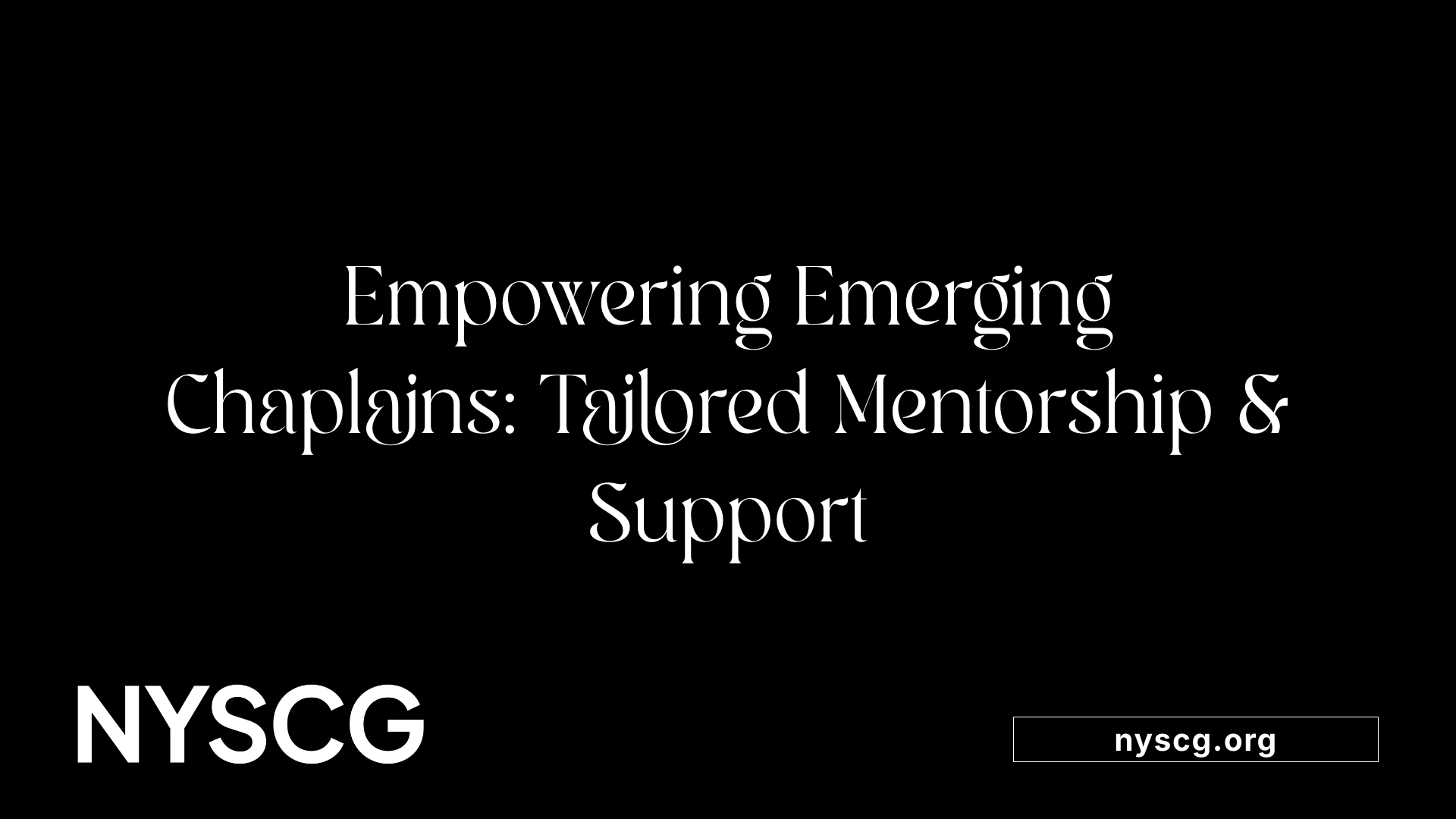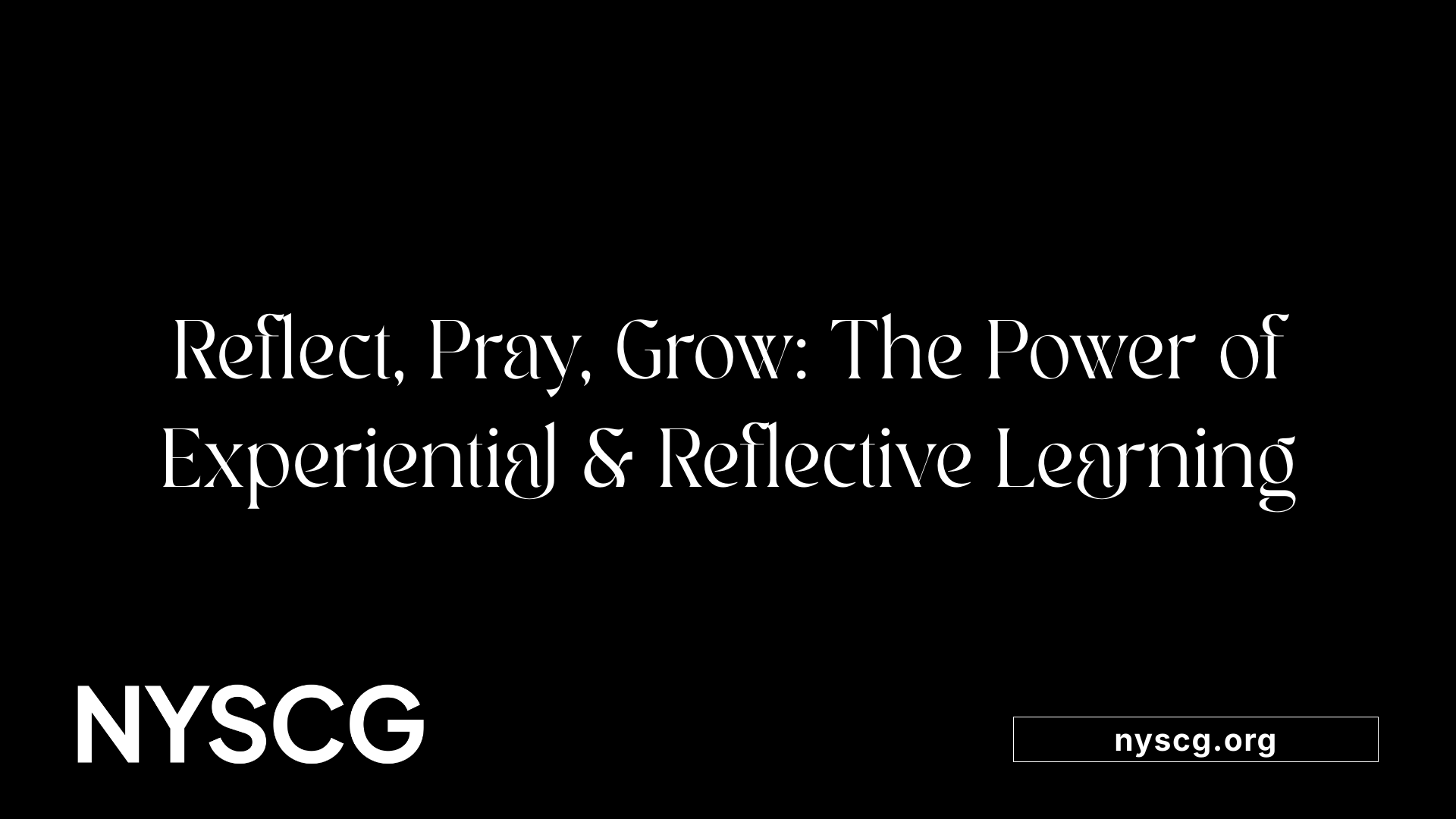What to Expect in a One-on-One Chaplain Mentorship Program


Embarking on a career as a chaplain involves more than just formal education; it requires ongoing mentorship, experiential learning, and professional development. One-on-one mentorship programs serve as vital avenues for aspiring chaplains to gain personalized guidance, refine their skills, and navigate the complex landscape of spiritual care within various settings. This article explores what participants can expect from such programs, highlighting their structure, objectives, and benefits.

The mentorship programs for emerging chaplains incorporate a blend of structured activities and flexible scheduling to foster growth and professional development. Typically, mentees participate in regular one-on-one meetings with their mentors—often monthly—where they discuss progress, challenges, and goals. These meetings may include shadowing experienced chaplains, participating in workshops, and reflective practices designed to enhance core skills like communication, spiritual guidance, and boundary setting.
Most programs also feature orientation sessions where mentees are introduced to their roles, followed by ongoing activities such as shadowing hospital chaplains for a few hours or days. Some programs schedule semi-annual check-ins to review progress, realign goals, and reflect on learning experiences. Additionally, virtual celebrations acknowledge milestones and foster a sense of community among participants.
In-person visits are occasionally arranged, supplemented by travel grants to support participation in key events or shadowing opportunities. Mentorship relationships are built on mutual guidance, with schedules tailored to accommodate both mentors’ and mentees’ availability, helping to create a supportive and consistent learning environment.

A standard mentorship experience combines practical hands-on training with reflective practices. Mentees often shadow seasoned chaplains during their daily interactions with patients, families, and staff, gaining real-world insight into the duties and emotional challenges of chaplaincy.
Mentors guide mentees through structured reflection exercises such as journaling, debriefing sessions, and discussion of pastoral encounters. These activities help develop self-awareness, emotional intelligence, and communication skills.
Scheduled meetings, whether virtual or in-person, provide opportunities for targeted instruction on core principles like spiritual care, cultural sensitivity, and crisis intervention. This approach ensures mentees can observe, participate, and gradually take on more responsibility within clinical settings, building confidence and competence.
Participants in mentorship programs can expect to deepen their practical skills and understanding of providing spiritual care across diverse contexts.
Through experiential learning, mentees develop key competencies such as active listening, pastoral counseling, and cultural sensitivity, which are essential for effective chaplaincy.
These activities foster emotional resilience, professional confidence, and a clearer self-identity as spiritual caregivers. Engaging in real-world scenarios under mentorship helps prepare individuals for certification exams and enhances their readiness to serve independently.
Furthermore, mentees benefit from personalized feedback, which accelerates skill acquisition and supports ongoing professional development.
The primary objectives include mastering communication skills, developing pastoral presence, and understanding the ethical and cultural aspects of spiritual care.
Mentorship encourages practical application of theoretical knowledge, helping participants integrate these skills naturally into their caregiving roles.
Benefits encompass improved preparedness for certification, stronger clinical and pastoral skills, and a more defined pastoral style.
Additionally, participation enhances leadership potential within chaplaincy and cultivates a network of professional contacts, fostering long-term career growth.
Mentors provide strategic guidance for fulfilling certification requirements, helping mentees understand competency expectations and navigate the application process.
They assist in reviewing reflective writings, preparing for certification exams, and identifying training opportunities for specialization.
Mentorship also supports long-term career planning by offering advice on leadership development, networking, and potential job opportunities.
This close guidance strengthens professional credibility, increases chances for certification success, and encourages ongoing engagement in the chaplaincy field.
Mentors are expected to share their expertise, provide constructive feedback, and serve as role models. They facilitate reflective dialogue and offer guidance tailored to the mentee’s developmental needs.
Mentees should proactively participate in scheduled sessions, seek feedback, and be open to learning from observations and experiences. They are encouraged to reflect critically, set personal goals, and demonstrate commitment to their growth.
Both parties share the responsibility of maintaining confidentiality, respecting boundaries, and fostering a supportive environment. Effective communication and mutual dedication are essential for a successful mentoring relationship.

In the context of chaplaincy development, reflection and prayer are vital tools for personal healing and growth. During mentorship programs, chaplains are encouraged to engage in regular prayerful reflection, creating a sacred space to process their experiences, emotions, and spiritual insights. This practice helps them confront personal challenges and fosters a sense of divine presence and comfort, which translates into more compassionate and empathetic care for those they serve.
Reflective exercises such as writing verbatims—detailed accountings of specific encounters—enable chaplains to analyze their responses and spiritual growth stages. These activities help identify areas of emotional or spiritual tension, allowing for targeted healing and renewed purpose. Prayer, combined with reflective dialogue, deepens the understanding of divine guidance and supports the development of a resilient faith identity amid the stresses of ministry.
Chaplains are encouraged to explore 'soul questions'—fundamental inquiries about purpose, faith, and life’s meaning. Mentorship sessions often create a safe environment for candid conversations about these questions, fostering self-awareness and spiritual maturity.
By engaging with these deep questions, chaplains gain clarity about their vocational calling and personal beliefs. This introspection promotes emotional resilience and helps integrate theological themes such as grace, hope, and divine immanence into everyday ministry. Addressing 'soul questions' is a transformative process that guides chaplains to align their personal faith with their professional roles, ensuring authenticity and depth in their service.
The integration of theological themes with practical ministry is a cornerstone of effective chaplaincy training. Mentors guide mentees through discussions surrounding core concepts like grace, hope, incarnation, and divine providence, encouraging them to relate these themes to real-world situations.
For example, reflective exercises might involve contemplating how divine grace impacts patient care or how hope sustains individuals facing trauma. This process helps chaplains develop the skills to interpret spiritual needs within diverse contexts—hospitals, military settings, or community outreach—and respond appropriately.
By actively connecting theology to practice, chaplains learn to serve with authenticity, fostering trust and spiritual healing in those they accompany. This holistic approach enriches their ministry, blending doctrinal understanding with compassion and cultural sensitivity.
In a typical mentorship program, the process extends beyond shadowing and active skill development. Mentors facilitate reflective exercises such as theological discussions, prayerful reflection, and writing verbatims, which allow mentees to explore their spiritual and professional identities deeply.
Mentors foster environments where mentees can examine 'soul questions,' such as faith, purpose, and vocation, through guided conversations. These interactions often include theological themes like grace, hope, and divine presence, woven into practical ministry scenarios. The mentor’s role is to encourage honest exploration and provide feedback on personal growth.
Additionally, mentorship activities include ongoing reflection on competencies, role-playing exercises, and sometimes spiritual retreats. These combined efforts support holistic development—spiritually, emotionally, and professionally—equipping mentees to meet the spiritual needs of their communities with confidence.
Participants in mentorship programs experience notable growth in their spiritual awareness and pastoral skills. The integration of reflection and theological dialogue fosters self-awareness, emotional resilience, and a stronger sense of vocational purpose.
Mentees often report a deeper understanding of their faith journey, improved ability to provide compassionate care, and greater clarity in their ministry roles. These activities contribute to spiritual healing and help mentees articulate their personal calling more effectively.
Furthermore, mentees develop competencies that enhance their ability to serve diverse populations with authenticity. The reflective process promotes agility in addressing complex emotional and spiritual issues, ultimately preparing them for leadership and certification in their chaplaincy careers.
The main goal of the mentorship is to facilitate integration—combining theological understanding with practical ministry skills. It aims to nurture spiritually mature chaplains capable of addressing complex emotional, spiritual, and cultural needs.
Participants benefit from emotional and spiritual resilience, clearer vocation identification, and enhanced capacity for compassionate service. The program promotes personal growth through reflection, theological engagement, and experiential activities.
By fostering a deep connection between faith and practice, mentorship helps chaplains serve with authenticity, fostering trust and healing among those they support. Overall, it supports their development into well-rounded, spiritually grounded caregivers.
Mentors assist candidates in articulating their spiritual journeys, reflecting on their competencies, and preparing compelling narratives for certification processes. This guidance is crucial during challenging phases of credentialing or when navigating career transitions.
Mentorship provides encouragement and strategic advice, linking mentees with resources and networks necessary for professional advancement. It ensures a comprehensive development process that aligns personal faith, professional skills, and certification requirements.
Mentors also help mentees reflect on and demonstrate their pastoral competencies, making their certification applications stronger and more authentic. These relationships serve as a vital bridge to certification and long-term career success.
Mentors are responsible for fostering deep theological reflection, spiritual growth, and honest exploration of personal faith and professional identity. They guide mentees in developing their pastoral voice and understanding complex issues.
Mentees should actively engage in reflective exercises, seek guidance for integrating faith into practice, and share their spiritual insights openly. Both parties must maintain confidentiality and respect individual expressions of faith.
Setting clear expectations—including meeting frequency, duration, and communication modes—is essential for a successful mentorship relationship. Dedication to creating a nurturing, respectful environment ensures that the mentorship benefits both parties and supports the mentee’s overall development.
Participating in a one-on-one chaplain mentorship program offers a comprehensive pathway for personal, spiritual, and professional development. Through structured activities, experiential learning, and reflective practices, mentees can thrive in their vocations. The ongoing support from dedicated mentors ensures that emerging chaplains are equipped not only with necessary skills but also with the resilience and confidence to serve effectively in diverse communities. Ultimately, these mentorship relationships foster a robust foundation for lifelong growth, leadership, and service in the vital field of spiritual care.
All you need is the will to make the world a better place.
New York State chaplain group inc. is a tax deductible organization with a federal tax Id number 92-383-4921